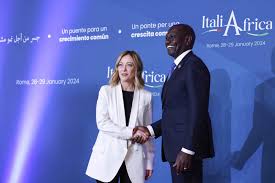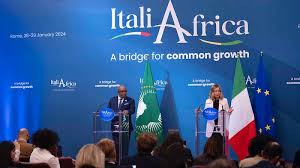Italy’s castor-oil plans for Africa

The Italian government’s Mattei Plan aims to position the country as an “energy hub” between Europe and Africa. Among other things, castor-oil plantations are being touted as a climate-friendly energy alternative.
Italian prime minister Giorgia Meloni welcomes Kenyan president William Ruto at the Italy-Africa conference in January.The latest supposedly green trend being touted in Africa as a climate-friendly energy alternative to fossil fuels are castor-oil plantations. Castor oil is considered a raw material for biofuels. Its cultivation has recently increased significantly on the continent. Plantations are sprouting up in many places.
The Italian mineral oil company Eni has been at the forefront of this “green solution” in Kenya, Angola, Mozambique and Côte d’Ivoire by establishing castor-oil plantations and extraction mills.

The “Mattei Plan”
As the pressure to reduce emissions increases, major oil companies are seeking to diversify their products and utilise greener alternatives to meet their net-zero targets by 2050. According to scientists at Kenya’s Jomo Kenyatta University of Agriculture and Technology working with Eni, the castor oil plant is a “low-maintenance, drought-resistant crop with low environmental impact” that will significantly reduce carbon emissions. However, the fact that castor-bean seeds also produce ricin, a toxic substance that is poisonous to wildlife, livestock and humans, seems to be ignored by all sides.
Smart technologies in the fight against the climate crisis
The call for castor-oil plantations, reminiscent of the jatropha biodiesel plants that failed to deliver the expected results a decade ago, has led the Italian multinational energy company to build two biofuel extraction plants in Kenya as part of its € 700 million budget to invest in green energy in Africa by 2026. Moreover, a biofuel strategy is included in the € 5 billion “Mattei Plan” for Africa, which is being driven by Italian prime minister Georgia Meloni and aims to turn the European country into an “energy hub” between Europe and Africa.
The Mattei Plan – named after the founder of Eni, Enrico Mattei – will be based on five main pillars: education and training, agriculture, health, water and energy. The latter is the most important for Italy.





